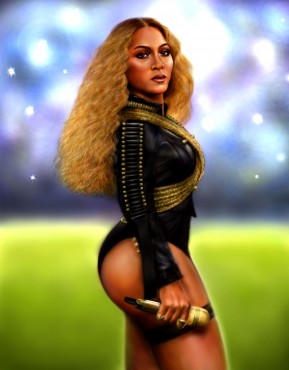So, the Super Bowl happened. There were a couple gangs of men running into each other and falling down, while some other dudes whistled and waved hankies, but more importantly: there was Beyoncé.
Because, in case you were under a rock somewhere or out living an actual life, Beyoncé didn’t simply slay. She used her performance to make a deliberate statement about the status of race in the U.S., with backup dancers dressed in homage to the Black Panthers, forming a choreographed ‘X’ as a shout out to Malcolm, and tossing in a few black-power salutes for good measure. This pissed off all the old white dudes’ running commentary following the Super Bowl, who felt the performance was inappropriate for a nice family event. (There wasn’t any sport to talk about, since the most notable part of the game was South Carolina’s defensive failings.) While political activism espousing violent resistance is an ethical issue unto itself, there is nonetheless something not just right but necessary about Beyoncé’s message . . . provided, of course, that it was a statement and not just a publicity stunt.
The difference between entertainer and artist is simple: one merely gains and sustains attention, while the other speaks their truths, through whatever medium they choose. Beyoncé hasn’t been an entertainer for years. She’s an artist, and her current truth is that the U.S. is defined by racialized tensions, which the state is ignoring, denying, or refusing to address. Having been handed an audience of millions on a silver plate, her artistic integrity demands that overwhelming influence not be taken lightly. Beyoncé must use it to motivate, inspire and inform, rather than merely milking it for profit.
The attitude of surprise and disdain which greeted Queen Bey’s performance is confounding, especially since the only way politics seems to get discussed now is as a footnote in entertainment coverage. Who cares about the Cosby scandals? That’s old news. Oh, wait, Kanye’s tweeting! Now we care! Who actually watched Marco Rubio disemboweled onstage by Chris Christie? Nobody, but we saw it in clips from every single late show that night. Who reads DeBeauvoir or hooks? Nobody, but we wear t-shirts with their words as slogans and coo over celebrities coming out as feminist (especially those of the Gosling or Hardy variety). We’ve handed over authority on political decisions to rich, pretty, popular people. Why shouldn’t they take that power and run with it?
This shouldn’t be a shock to anyone; after all, the crumpled napkin of a group that is Coldplay did much the same thing with their “believe in love” message. Is it the case that celebrities can only be political when presenting safe messages, rather than those which are immediate, specific, and relevant?
Or is it specifically the message of African-American resistance which is concerning? After all, there’s a long history of African-American artists being punished for their allegiance to civil rights advocacy. Beyoncé has stepped into some historically impressive shoes as a black woman singing about black lives in the USA: jazz artist Billie Holiday was banned and blacklisted from several states for recording Strange Fruit in the ‘30s; the incomparable Nina Simone was dropped and sent broke for her advocacy in the ‘60s and ‘70s. Both are venerated now as two of the greatest artists in the history of jazz, if not music full stop. Beyoncé doesn’t have to wait for society to catch up; we’re already massive fans and no old white dudes can stop us falling into formation. Whether her truth will speak to us, however, remains to be seen.







